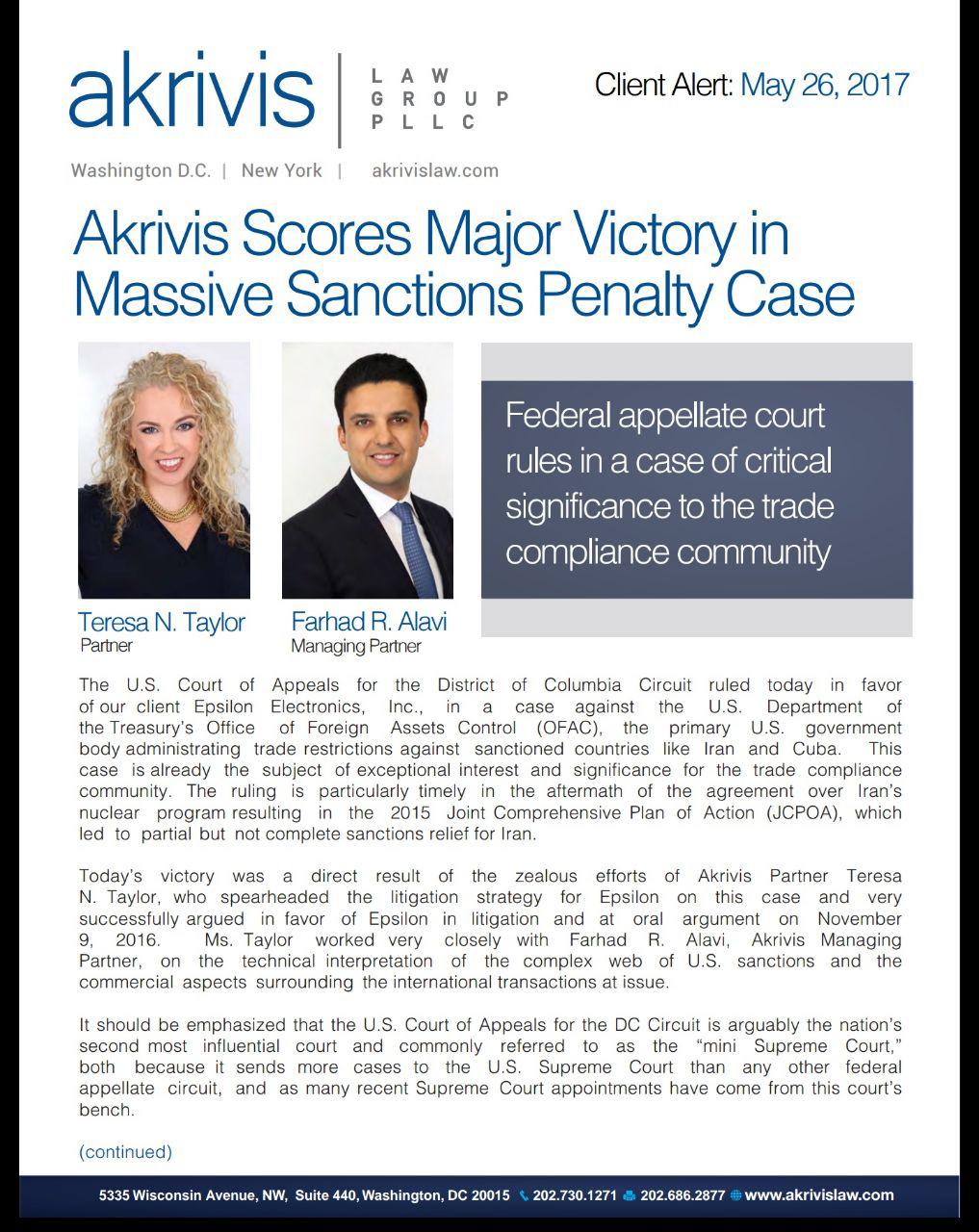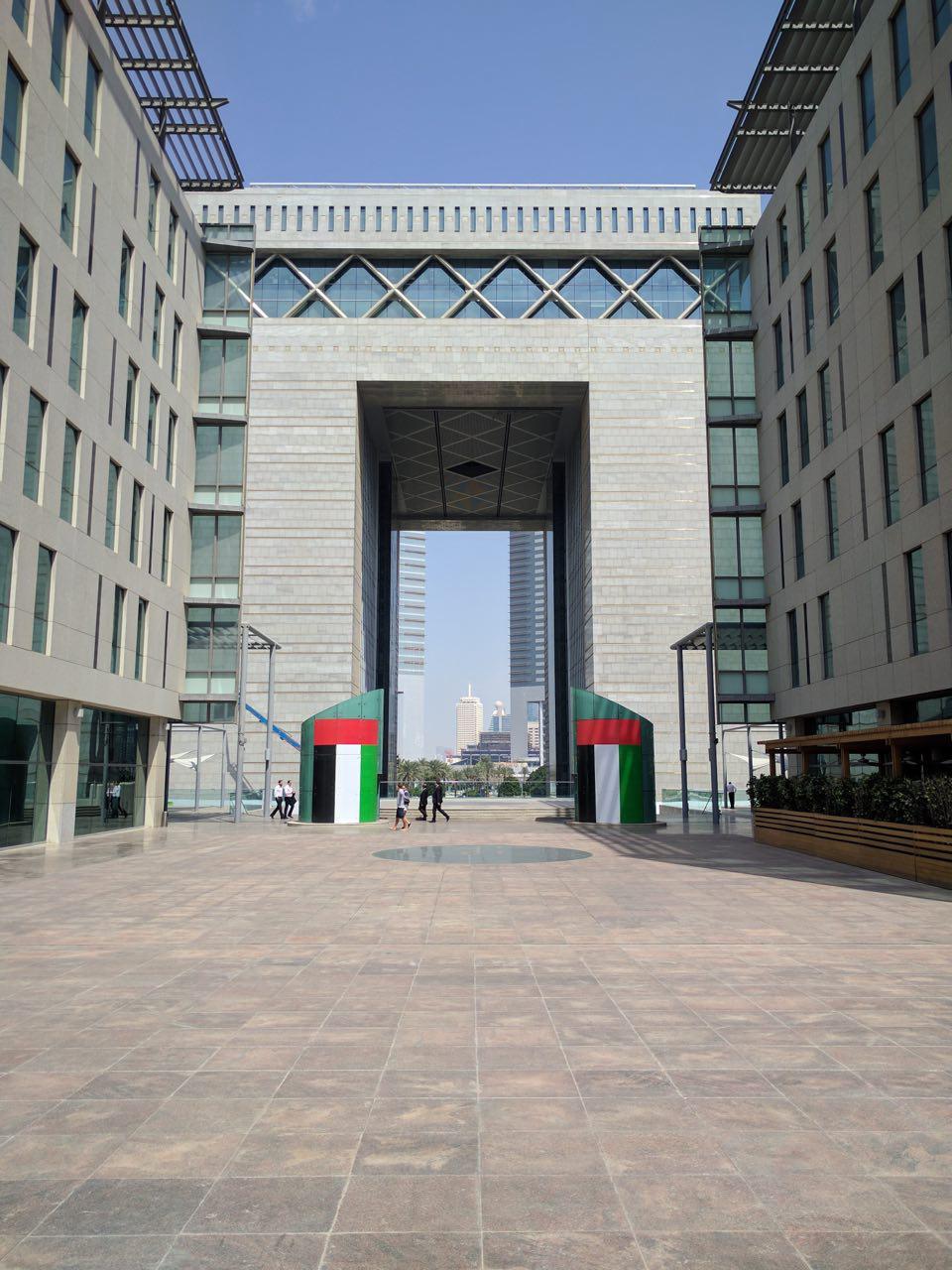I’m proud of my firm and my team’s big win that came out yesterday in a major, widely-watched sanctions case at the U.S. Court of Appeals for the District of Columbia Circuit. Read our last alert to see why win is important not just for our client but for the trade community. The U.S. Court of Appeals for the District of Columbia Circuit ruled today in favor of our client Epsilon Electronics, Inc., in a case against the U.S. Department of the Treasury’s Office of Foreign Assets Control (OFAC), the primary U.S. government body administrating trade restrictions against sanctioned countries like Iran and Cuba. This case is already the subject of exceptional interest and significance for the trade compliance community. The ruling is particularly timely in the aftermath of the agreement over Iran’s nuclear program resulting in the 2015 Joint Comprehensive Plan of Action (JCPOA), which led to partial but not complete sanctions relief for Iran.
The U.S. Court of Appeals for the District of Columbia Circuit ruled today in favor of our client Epsilon Electronics, Inc., in a case against the U.S. Department of the Treasury’s Office of Foreign Assets Control (OFAC), the primary U.S. government body administrating trade restrictions against sanctioned countries like Iran and Cuba. This case is already the subject of exceptional interest and significance for the trade compliance community. The ruling is particularly timely in the aftermath of the agreement over Iran’s nuclear program resulting in the 2015 Joint Comprehensive Plan of Action (JCPOA), which led to partial but not complete sanctions relief for Iran.
Today’s victory was a direct result of the zealous efforts of Akrivis Partner Teresa N. Taylor, who spearheaded the litigation strategy for Epsilon on this case and very successfully argued in favor of Epsilon in litigation and at oral argument on November 9, 2016. Ms. Taylor worked very closely with Farhad R. Alavi, Akrivis Managing Partner, on the technical interpretation of the complex web of U.S. sanctions and the commercial aspects surrounding the international transactions at issue.
It should be emphasized that the U.S. Court of Appeals for the DC Circuit is arguably the nation’s second most influential court and commonly referred to as the “mini Supreme Court,” both because it sends more cases to the U.S. Supreme Court than any other federal appellate circuit, and as many recent Supreme Court appointments have come from this court’s bench.
Factual Context
Epsilon Electronics is a small business in southern California in the automotive after-market business. In July 2014, OFAC imposed a massive $4,073,000 penalty on Epsilon, alleging that a series of shipments by the company to Asra International Corporation, LLC in Dubai, United Arab Emirates (UAE) were in fact destined for end-use in Iran, which would signify a breach of U.S. sanctions. $1.25 million of this penalty stemmed from five shipments in 2012 to Asra International, wherein OFAC imposed the maximum $250,000 statutory penalty at the time per shipment, although some of these shipments being only several hundred dollars in value and even though Asra International had a retail store in Dubai that was selling Epsilon’s products. This penalty was imposed despite Epsilon’s cooperation with OFAC during its investigation and it being a modestly sized family enterprise of limited sophistication.
This case turned on the issue of the Administrative Procedure Act (APA), U.S. sanctions on Iran, and U.S. Constitutional Claims. It is exceptionally challenging to bring APA cases before federal courts after a final agency action. Courts have relied on prior cases, which establish that federal agencies such as OFAC, the Bureau of Industry and Security (BIS), or the Environmental Protection Agency (EPA) are subject matter experts in their respective domains and that judges should give such agencies a high degree of deference and not second-guess their rulings on subject-specific matters. This premise holds that courts should only review federal agency actions when they are “arbitrary and capricious.” Akrivis argued this on Epsilon’s behalf, among many other claims.
The U.S. Court of Appeals for the District of Columbia Circuit today remanded the case to the district court, with instructions to remand the matter to OFAC for further consideration of the five alleged 2012 violations, and calculation of the total monetary penalty imposed for all liability findings. The Court’s order also remanded OFAC’s determination that Epsilon’s five shipments to Asra International in 2012 violated the regulations. OFAC’s determination that Epsilon had reason to know that the 2012 shipments were specifically intended for reexport to Iran was not supported by substantial evidence and was therefore arbitrary and capricious, as OFAC did not explain in the Administrative Record why e-mails between Epsilon and Asra regarding Asra’s stores in Dubai were not credible evidence.
What this means for Compliance
Beyond the many benefits accruing to Epsilon, today’s opinion is a standard bearer for the trade compliance community as it establishes several key precedents. First, as OFAC is rarely challenged and because OFAC’s holdings are not fully available for public access it offers a crucial, rare window into the inner workings of U.S. sanctions policy. Second, the case also demonstrates that agency enforcement actions can be subject to greater judicial review, which could lead to enhanced transparency in the dialogue between alleged violators and the government in the penalty phase at the administrative level. Third, it establishes that the government does not need to prove that goods or services actually reached the sanctioned destination, but it must clearly establish reason to know that such exports were intended specifically for the that destination.
The Epsilon case is particularly important for U.S. businesses exporting to the Middle East, particularly the UAE because it reveals OFAC’s interpretations of key regulations, which will help companies chart out key compliance strategies. Further, the case’s importance extends far beyond the Middle East to companies doing business overseas, particularly regions with higher sanctions risks exposure, be they in the Persian Gulf region, Russia, Cuba, or elsewhere. This explains why this case has been the subject of numerous articles and presentations around the world.
The positive outcome in this case is a direct result of the hard work and diligence of Ms. Taylor, an experienced litigator and former federal law clerk. Prior to joining Akrivis, Ms. Taylor served in the office of the Chief Counsel at the U.S. Department of the Treasury and practiced at a leading global law firm. Ms. Taylor’s experience includes extensive work on federal litigation and investigatory matters involving U.S. trade laws. Ms. Taylor’s experience has helped Akrivis build a highly sophisticated federal white collar practice.
Mr. Alavi, also previously with leading global law firms, is a frequent commentator appearing in international media on U.S. sanctions and trade laws. He regularly advises U.S. and foreign companies on related complex compliance and cross-border commercial matters. More broadly, Akrivis’s team has long been established as a go-to firm for U.S. trade compliance, particularly the area of U.S. sanctions.
Akrivis Law Group, PLLC would also like to thank its team for their hard work, as well as Abu Dhabi-based attorney John P. McGowan, Jr., who submitted an amicus brief on behalf of his company JPM Legal Advisors Worldwide Ltd., and his counsel.
Citation: Epsilon Electronics, Inc. v. U.S. Department of the Treasury, Office of Foreign Assets Control, et al., No. 1:16-5118 slip op. (D.C. Cir. May 26, 2017)
The opinion can be ready by clicking on this link on the Court’s website. A PDF version of this alert is available here.
The text of this post has been copied verbatim from Akrivis Law Group’s website.

 The U.S. Court of Appeals for the District of Columbia Circuit ruled today in favor of our client Epsilon Electronics, Inc., in a case against the U.S. Department of the Treasury’s Office of Foreign Assets Control (OFAC), the primary U.S. government body administrating trade restrictions against sanctioned countries like Iran and Cuba. This case is already the subject of exceptional interest and significance for the trade compliance community. The ruling is particularly timely in the aftermath of the agreement over Iran’s nuclear program resulting in the 2015 Joint Comprehensive Plan of Action (JCPOA), which led to partial but not complete sanctions relief for Iran.
The U.S. Court of Appeals for the District of Columbia Circuit ruled today in favor of our client Epsilon Electronics, Inc., in a case against the U.S. Department of the Treasury’s Office of Foreign Assets Control (OFAC), the primary U.S. government body administrating trade restrictions against sanctioned countries like Iran and Cuba. This case is already the subject of exceptional interest and significance for the trade compliance community. The ruling is particularly timely in the aftermath of the agreement over Iran’s nuclear program resulting in the 2015 Joint Comprehensive Plan of Action (JCPOA), which led to partial but not complete sanctions relief for Iran. What is FATCA?
What is FATCA?